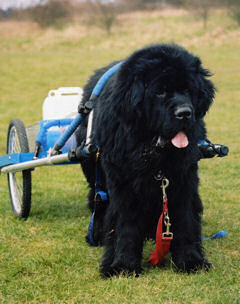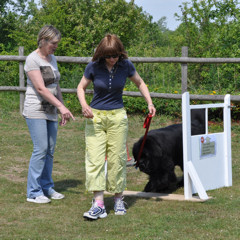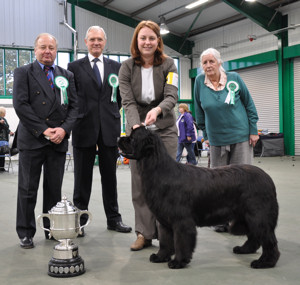A few tips
Land training away from the water, in your garden or in a park can have great benefits. For example, if you are having trouble getting your dog to perform an 'underwater retrieve' (exercise B4 in the official tests), use a large bowl of water in the garden with a favourite toy as the retrieve object and praise the dog and or give it a reward whenever it lifts the object out of the water. The dog will soon realise what is required and this often overcomes a reluctance to put it's nose and mouth underwater.
If your dog is struggling with a basic retrieve of a provided object (exercise B3 in the tests), take the problem object(s) to a park - the bewildered looks on people's faces are amusing when you are carrying a life-jacket or a life-ring over your shoulder miles away from the nearest water! When your dog begins to successfully retrieve these 'strange' articles away from the water and transfers this confidence to the lake, it will be time and effort well spent.
Be patient
 Water training can be rewarding and great fun for you and your dog. It is one of the best forms of exercise for a Newfoundland. It can equally be frustrating when your dog does not do what you know it can, or what you think it should do. Even well trained and experienced Newfoundlands have the habit of performing an exercise perfectly one week, but a week later they appear to have never done it before! Remember, they are not machines and can get distracted, bored, or on that day be just not bothered. A sense of perspective should be maintained and harsh handling or bullying of a dog is always unacceptable. All that achieves is to make your dog fearful, hesitant and reluctant to perform at all. With most newfies, firm clear and consistent verbal commands are necessary to successfully control the dog. Some dogs become confused when an unusually firm tone is used, or a number of instructions it has never heard before are shouted at it. Always be aware of your tone, commands and bearing.
Water training can be rewarding and great fun for you and your dog. It is one of the best forms of exercise for a Newfoundland. It can equally be frustrating when your dog does not do what you know it can, or what you think it should do. Even well trained and experienced Newfoundlands have the habit of performing an exercise perfectly one week, but a week later they appear to have never done it before! Remember, they are not machines and can get distracted, bored, or on that day be just not bothered. A sense of perspective should be maintained and harsh handling or bullying of a dog is always unacceptable. All that achieves is to make your dog fearful, hesitant and reluctant to perform at all. With most newfies, firm clear and consistent verbal commands are necessary to successfully control the dog. Some dogs become confused when an unusually firm tone is used, or a number of instructions it has never heard before are shouted at it. Always be aware of your tone, commands and bearing.
Care for your dogs
After a training session you will be left with a wet or damp dog. If there is a facility to rinse your dog down with clean water, please use it! We have such a facility at Grangewaters. Many training waters are not particularly clean and a good soak with clean water may help your dog avoid skin complaints caused by pollutants in the water remaining in the dog's coat. NEVER let your dog swim in water that has, or you suspect might have blue/green algae in it, it's a killer of dogs.
The thorough drying of dogs as soon as possible after training is recommended. We have a generator and blaster to dry our dogs after swimming. Limbs or joints that are left damp can become stiff and ears with moisture left in them can become infected. Also, coats are more likely to mat if left damp and un-groomed. Do not feed your dog immediately before or after exercise as this can increase the risk of a Gastric Torsion (Bloat) which is not uncommon in Newfoundlands. Ideally, do not feed your dog for about two hours before or after a training session.


